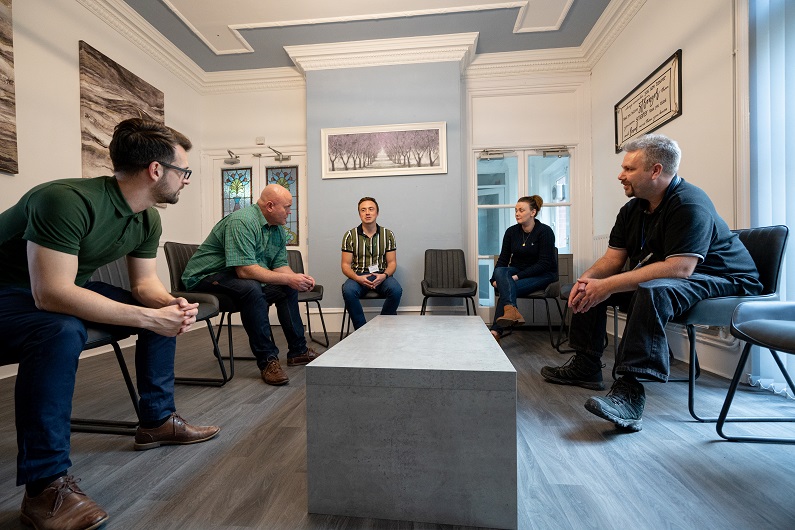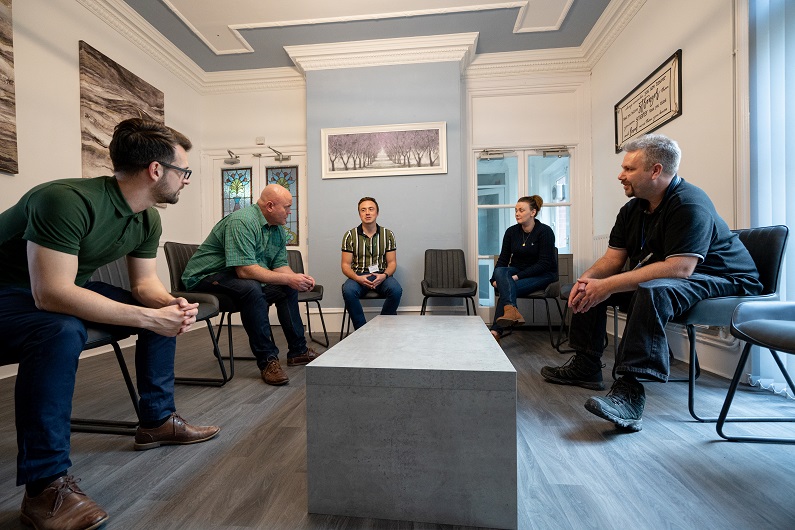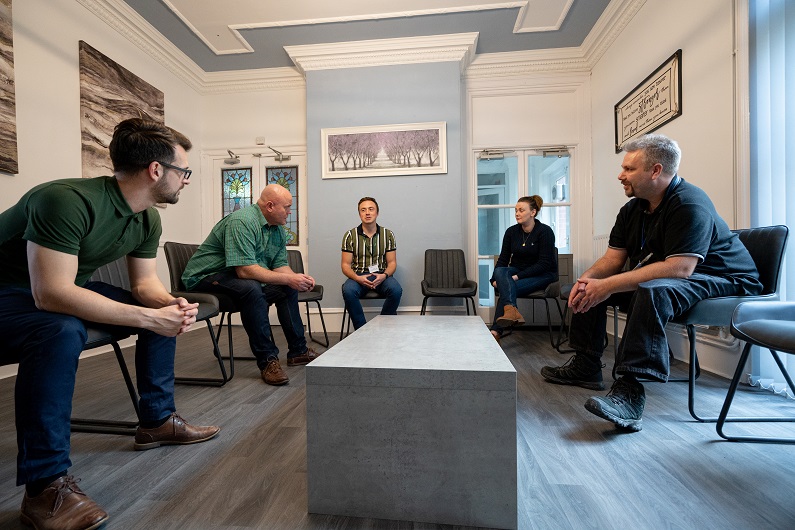20+ Years Experience
Specialist Drug Addiction Clinics

As society’s view on cannabis evolves, so does the understanding of its potential for addiction and the need for effective cannabis addiction treatment options.
With a variety of therapeutic interventions, support resources, and rehab programs available, there is hope for those struggling with cannabis addiction.
In this enlightening blog post, we will delve into the different aspects of marijuana addiction, explore the treatment approaches, and provide guidance on choosing the right rehab centre for marijuana addiction treatment and recovery.
Cannabis addiction, a form of drug addiction, is a condition where the brain adapts to the chemicals within cannabis plants, requiring greater amounts to achieve the same effect.
Although the risk of developing an addiction to cannabis is relatively low compared to other substances, prolonged use can lead to cannabis abuse and cannabis dependency, negatively impacting one’s psychological well-being and affecting various aspects of life such as career, education, and relationships.
Approximately half of all adolescents have experimented with the cannabis sativa plant at some point, leading to a need for cannabis addiction treatment.
Cannabis consumption can evoke a range of positive feelings, such as euphoria, relaxation, and enhanced creativity.
However, it can also cause temporary psychosis, increase the likelihood of developing psychotic illnesses, and impair psychological capabilities, especially in adolescents.
The physical effects of marijuana addiction can include:
Chronic and frequent use of cannabis may also have long-term repercussions on the body, including potential respiratory issues and an increased risk of certain mental health problems.
It is estimated that 10% of cannabis users may develop an addiction to the drug, with the probability increasing to 16% for those who begin using in their teens.
Factors that contribute to the risk of weed addiction include untreated mental disorders, using the drug to escape distress and the level of THC in cannabis varieties.
The quantity of THC ingested when ingesting cannabis can influence the intensity of the high, with particularly potent types of cannabis believed to increase the probability of addiction.
A wide range of treatment approaches are available for cannabis addiction, offering hope and support to those seeking recovery.
These include detoxification, residential rehabilitation, and outpatient therapy, all administered by professional therapists in a safe and ideal setting.
One such option is cannabis addiction rehab, which focuses specifically on addressing the challenges faced by recovery cannabis rehab clients struggling with this particular addiction at a cannabis rehab clinic.
The purpose of rehab treatment for weed addiction is to furnish patients with the requisite coping strategies to avert recurrence and embark on a fresh lifestyle.
The initial stage of private cannabis rehab involves a period of cannabis detoxification, which should be managed by a professional.
Individuals who are addicted to cannabis can suffer from various psychological and physical symptoms of marijuana withdrawal.
These include:
Strategies may be implemented to manage these withdrawal symptoms should they become too uncomfortable.
These strategies may include medications, cognitive-behaviour therapy, and lifestyle changes.
Our team will offer patients struggling with weed addiction individual medical support that suits their personal circumstances.
Long term users may experience withdrawal symptoms during the recovery process, however our creative therapies during the cannabis rehab treatment ensure a safe and steady recovery.
Both residential rehab and outpatient rehab programs provide tailored treatment plans.
With residential treatment programs providing round-the-clock support and a secure environment for recovery.
Inpatient treatment for marijuana addiction offers a secure, confidential, and pleasant residential environment for stays of between 30 and 90 days.
Outpatient treatment needs certain appointments to be booked and conducted at the facility, like therapy or health assessment. The addict must then carry out the other parts of the treatment plan on their own.
To address the psychological aspects of cannabis addiction, different therapy models are employed, such as Cognitive Behaviour Therapy (CBT), Motivational Interviewing (MI), and group therapy and family therapy.
These therapeutic interventions play a crucial role in helping individuals overcome their addiction and maintain long-term abstinence.
CBT is a psychotherapeutic approach that seeks to improve an individual’s overall mental health by:
In the context of cannabis addiction treatment, CBT addresses the inaccurate beliefs of cannabis addicts and facilitates the development of healthier thought patterns to alleviate anxiety.
Motivational Interviewing (MI) is a counselling approach that assists individuals in resolving ambivalence and increasing their motivation for behaviour change.
In cannabis addiction treatment, MI addresses individuals resistant to change and explores both positive aspects and negative consequences of cannabis use with the aim of motivating them to alter their behaviour.
The therapist’s role in MI is to facilitate an open conversation with the client concerning their cannabis use behaviour and to evaluate the advantageous and disadvantageous aspects of cannabis use.
Group therapy provides a platform for individuals to:
Family therapy, on the other hand, seeks to address the consequences of addiction on family relationships.
Various support resources are available for marijuana addiction recovery, including:
These resources play a significant role in helping individuals maintain abstinence and prevent relapse, ensuring a successful and lasting recovery.
NA and MA are support groups that provide free assistance and customized meetings for the recovery of weed addiction. These groups offer:
By participating in these support group therapies, individuals can receive the help they need to overcome their marijuana addiction.
NA and MA meetings often include discussions on maintaining abstinence, coping with cravings, and developing healthy relationships with others who share similar experiences.
Support services for cannabis addiction are available through local community projects and specialist charities, with referrals from GPs and the National Health Service.
These projects may encompass support groups, educational programs, and other activities designed to help individuals overcome their addiction and reintegrate into society.
Specialist charities may offer financial assistance, counselling, and other services, ensuring a comprehensive approach to recovery.
Dual-diagnosis patients often have mental health conditions alongside marijuana use disorder, making it essential for rehab centres to treat both conditions simultaneously.
Depression and anxiety-based conditions are commonly observed in individuals with weed addiction.
Treating both mental conditions and cannabis use concurrently in rehab facilities assists in disrupting the cycle of marijuana dependence that has been established.
The average cost of cannabis addiction medical care ranges from £2,000 – £40,000.
Factors affecting the cost of cannabis rehab include location, duration, and type of treatment programme.
The average duration of cannabis addiction treatment spans between 30 and 90 days, with the specific duration determined by a range of factors and discussed with a medical professional or addiction specialist.
It is worth noting that some health insurance policies may provide coverage for addiction treatment, including residential rehabilitation, but not all policies are likely to do so.
If you require more information on long term treatment, please contact our team today.
Consulting an addiction specialist is imperative when selecting an appropriate cannabis rehab centre, as they can aid in taking into account factors such as location, inpatient or outpatient programs, and specific treatment approaches.
Personal preferences, such as proximity to family members or creating a separation between treatment and everyday life, should also be considered.
Ensuring that the chosen rehab centre offers the necessary treatments and support resources will significantly impact the success of the recovery process.
If you are looking for rehab for cannabis cravings and substance misuse, please make sure to contact us today. We can help you quit cannabis for good and also offer information on relapse prevention.
In conclusion, understanding marijuana addiction and the available treatments is crucial for those seeking recovery.
With a variety of therapeutic interventions, support resources, and rehab programs, individuals struggling with cannabis addiction can find the help they need to regain control of their lives and achieve lasting sobriety.
Consult with an addiction specialist to choose the most suitable rehab for cannabis dependence, and embark on the journey towards a healthier, happier future.
The best treatment for marijuana use disorder is cognitive behaviour therapy.
This teaches strategies to identify and correct problematic behaviours in order to enhance self-control and stop drug use.
Contingency management may also be effective, providing tangible rewards for positive behaviours.
Short-term symptomatic medications, such as diazepam 5 to 10mg QID for up to ten days, may be prescribed to help alleviate the symptoms of withdrawal from cannabis.
However, no specific medications have been shown to be effective in treating it.
The current best psychosocial intervention to reduce cannabis use is a combination of Motivational Enhancement Therapy, CBT, and Contingency Management.
These strategies aim to help people identify and address problematic behaviours associated with eating or smoking cannabis, thereby helping them gain greater self-control and to stop their substance use.
Common withdrawal symptoms associated with marijuana addiction include:
The typical duration of cannabis addiction treatment is between 30 and 90 days.
Cannabis is addictive.
Substance misuse can cause various problems including cannabis intoxication and various health problems.
Evidence suggests cannabis drug taking (and other drugs) can be extremely dangerous for many people, including young adults.
There are a range of other services that we can provide. Have a look at the list below for more information:






















We Aim To Reply To All Enquiries With-in 24-Hours